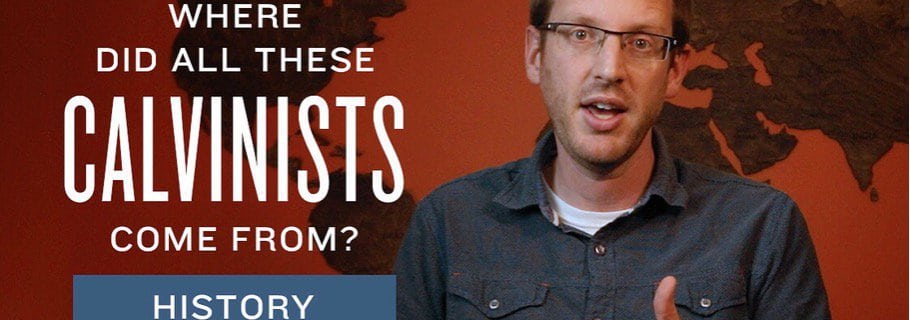Where did all these Calvinists come from? This is a question I was asked recently and I thought I might answer in video format. Actually, I’ll answer in three videos. Today I’ll tell a little about the history of the New Calvinism, then in future videos talk about evidences of grace within the movement and finally suggest some areas it would do well to improve. Here it is in YouTube and Facebook formats. For those who prefer to read, I’ve included a rough transcript.
Transcript
If you’re a Christian, I’m pretty sure you’ve got an opinion about Calvinism or what you might know as Reformed theology. Actually, you’ve probably got a very strong opinion about it. But whatever your opinion is, I believe one thing is beyond dispute: Over the last few years we’ve seen a huge resurgence of Reformed theology. Today I’m going to talk about how that happened and where it came from.
Today we are talking about the New Calvinism or Reformed Theology. Or maybe you know it as the Young, Restless, Reformed movement. Whatever you call it, I believe we can trace its beginnings to the church growth movement. You need to remember this movement was hugely influential in the late 90s and early 2000s.
The church growth movement was led by men like Rick Warren and Bill Hybels who had grown their churches into some of the biggest and most influential in the United States. They were writing books, leading conferences that essentially advocated a form of Christian pragmatism. Pragmatism is all about judging the rightness or wrongness of an action by the results it brings about. It begins with a goal in mind, then assumes that whatever brings about that goal is necessarily good. The result church growth leaders wanted was lots of people making professions of faith in Jesus Christ. That’s a good goal. But it was the way they got there that proved troublesome.
To get people to hear about Jesus, you first needed to get them into church. But how do you get people into church, especially when most people have already tried and rejected it? You change church to make it more appealing. You strip out any elements that might make people uncomfortable and add elements that will motivate them to come and to stay. You even survey the people around your church to ask, “what will it take for you to come to our church?” Then you make sure you deliver it. This wasn’t all bad. There was a helpful emphasis on removing barriers for people who were unchurched and assessing churches to ensure they were doing things with excellence. But what happened is that churches completely redefined themselves to be appealing to unbelievers. Instead of going to the Bible to ask, “What does God say churches must be?” and to history to ask, “How have Christians understood God’s commands?,” people turned to unbelievers to ask, “What do you want?”
Sermons became short and topical instead of longer and expositional. Doctrine was stripped away to focus instead on meeting felt needs. Long prayers were removed in favor of short prayers of response and commitment. Old hymns were neglected in favor of new choruses. Even the word “church” was removed from many congregations in case it would prove a hindrance to people. We started to hear slogans like “this is not your grandparent’s church” or “this is a church for people who don’t like church.” At its worst, this led to a kind of programmatic, big-box Christianity that could be bought and sold, transferred and duplicated. The promise was: Copy our model, implement our programs, preach our sermons, and watch your church explode in growth. It led to a kind of church that felt impersonal. It lost all sense of the sacred. Doctrine got shelved and forgotten. Church became all about the numbers.
A growing number of people began to express concern with this movement and they responded in at least two very different ways.
One group determined that they would focus on recovering authentic Christian community and began to refer to themselves as the Emerging Church or Emergent. They called for a new kind of Christianity that downplayed theological distinctions in favor of authenticity and community. They met in small, local gatherings and fostered online communities. Their leaders were people like Brian MacLaren, Tony Jones, Rob Bell. They did generate that sense of community but theologically they soon drifted right back to theological liberalism of the early twentieth century. The authenticity they wanted often came at the expense of sound theology drawn from the Bible. Without robust theological grounding the movement quickly drifted, then faded.
The second group pushing back against church growth determined that they would focus on recovering authentic Christian doctrine by looking back to the theology of the Protestant Reformers. They called for the recovery of doctrine that had been forgotten, neglected, or displaced—doctrine known as Calvinism or Reformed theology. This began as an organic movement and grew by connections made through the Internet and, especially, through the new medium of social media. Social media led people to books, to podcasts, to sermon archives, to conferences, to churches. They began to gather around a handful of Reformed preachers like John MacArthur, John Piper, and R.C. Sproul. D.A Carson and Tim Keller soon played key roles. A new generation of leaders rose up, led by men like Albert Mohler, Mark Dever, and behind them the next generation—Kevin DeYoung, Matt Chandler, and David Platt. This movement soon began to gather in conferences like Together for the Gospel while organizations like The Gospel Coalition began to try to define and organize the movement.
Christian publishers inevitably turned their attention to the movement, releasing hundreds, then thousands of books by and for this group. Christian and mainstream publications described and defined the movement with monickers such as Young, Restless, Reformed (Christianity Today) and the New Calvinism (Time). It continued to grow and spread beyond America and across the world. Today you can visit nearly any country in the world and find people who consider themselves a part of it.
That’s just a little glimpse of where this movement came from. It’s clear to me that God has been at work in and through this Reformed resurgence. But, of course, if it’s a movement that involves human beings it won’t all be good, will it? I can’t. In the videos that follow I want to identify God’s grace within New Calvinism by offering my assessment of some strengths of the movement. Then I want to suggest some weaknesses the movement may need to address.










